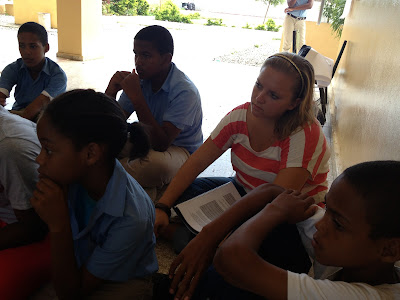Caminante works each day with kids and families to ensure
that the rights of all people are met, men, women, and children. A large part
of this mission is accompaniment and open discussion with families and the
varying parts of the families. One of
the very important subjects Caminante creates conversation about is gender
relations, gender stereotypes and culture, and sexuality. This conversation is
important in every subgroup.

The DPV (Desportes Para La Vida) has an amazing activity for
youth to create a safe space to discuss gender roles, expectations, dating,
marriage, sex and everything in between. This activity is called “El Estadio
del Genero”. The group is asked to
create an inner and outer circle, each sex taking a turn to sit in the center
and have a facilitated discussion. The outer group is asked to respectfully
listen to the conversation of the inner circle, knowing they too will have a
chance to discuss.

My students discuss, at incredible depth and insight, what
they have seen, heard, experienced as a male or female member of the community.
As a female, I facilitated the girls circle in one of my classes… my girls
discussed how they don’t think it is fair that the expectation is for them to
clean and cook while the men or boys do not have to help. They said they think
that they need to do these things for their family, and future husbands and
children, because they need to take care of them. I asked them why men don’t do
those things, because obviously, the physically “CAN” wash or cook. My girls responded
that men take care of the family in other ways.
The girls also discussed how the most challenging thing
about being a girl is, being a girl. What they meant, and discussed further,
was that the expectation of being a girl is high. You need to be pretty, look
good, get attention, sometimes unwanted, on the street, and be a “good”
girlfriend/wife. Both the boys and girls talked about “amigos de recho” or
friends with benefits and the difference of this status than “novio/a.”
Something I was a little worried to hear, because I hope my pre-teens don’t
feel any need for a friend with benefits at this age! This trend is popular in
TV and movies right now with several stories following the lives of “unattached”
singles with exciting and fun sex lives.

Two of the questions in the activity ask about gender violence
and alcohol. My girls are very aware of violence in their communities. They
state that they think it is wrong, but I fear that knowing something is wrong
isn’t always enough. It takes incredible strength and will power to do
something to stop violence against yourself, a family member, or a friend. In a discussion with our group EPE, high
school aged students, one of the girls told the group about a friend in a
domestically violent relationship. She said she tried talking to her friend,
but knew that wasn’t enough. She has reported the violence to Caminante, but
unfortunately, Caminante can only follow up with the young lady… like in the
US, no legal action can be taken unless the woman reports the violence. The
teen girl in EPC noted that protecting your family, even your possibly violent
husband, takes precedence. In the gender circles, my girls, intelligently
stated that alcohol is dangerous for them at times because one, it can provoke
violence and it changes how people act and two, it can make you do things you
may not intend.

While my group of 13-17 year olds may not always be the most
mature, calm, or the greatest listeners, this activity really brought out the
best in them. They laughed and giggled, but they also talked about some amazingly
intelligent and important things… what they see, feel, and experience in their
own families and communities. They are growing up in a culture where
expectations of gender are high, men are expected to be very masculine and strong
while women are expected to be beautiful and primarily dedicated girlfriends/mothers/wives.
No comments:
Post a Comment